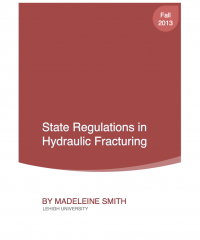
Research Paper:
Paper Subheadings:

Introduction:
Regulation of hydraulic fracturing, or fracking, has become one of the most complex environmental and political issues of the 21st century. Because of the prominent global conflicts over oil and gas, as well as pressing air pollution problems, the United States and many other countries have begun to look for alternative energy sources to address these concerns. Natural gas is proving to be one of the cheapest and most plentiful energy resources, and may be a viable renewable energy solution if the total supply continues to increase along with energy demand as predicted (AEO Table Browser, 2013).
States are facing a critical turning point in terms of taking responsibility for health and the environment because of the rapidly evolving natural gas industry. The large number of unprecedented questions waiting to be answered concerning safety, land rights, policy and pollution among other issues, have caused a great deal of political and some civil unrest. Because federal regulations are so broad and vaguely defined, states are left with a great deal of power to set the tone for future fracking endeavors and test government decision-making power. Controversy exists and will continue to exist in almost all facets of fracking until much more scientific research can definitively evaluate the impacts of chemical use on factors such as health and the environment. Until that point, it is up to states to wade through the sea of issues and competing opinions regarding fracking.
Decisions made by a state could directly impact ordinary citizens, especially when dealing with setting limits on fracking around schools, drinking water supplies and private land. Uninvolved people could very easily be swept into the fracking scene if a natural gas play is discovered near their homes or workplace.
Regulation and enforcement of fracking laws at the state level is a disorganized, unconsolidated process at best. Although fracking has been around for decades in the western United States, especially in rural areas, the recent discovery of many more natural gas deposits has opened the doors to new fracking possibilities and left state governments in a tailspin trying to keep up.
